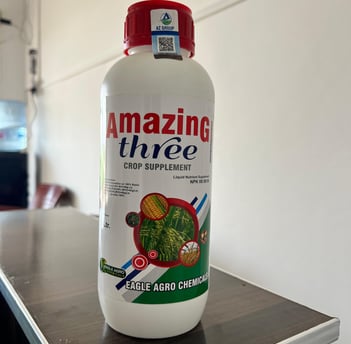its a crop supplement
The Role of Crop Supplements in Modern Agriculture Introduction In the ever-evolving world of agriculture, farmers are continuously looking for ways to enhance crop yields, improve soil health, and increase resistance to pests and diseases. One of the most effective tools in modern farming is the use of crop supplements—products designed to provide essential nutrients and improve plant growth beyond traditional fertilizers. These supplements include bio-stimulants, micronutrient enhancers, organic amendments, and soil conditioners, all of which play a crucial role in sustainable and productive farming. What Are Crop Supplements? Crop supplements are additives that enhance plant growth, strengthen root systems, and boost overall productivity. Unlike conventional fertilizers that primarily supply macronutrients like nitrogen (N), phosphorus (P), and potassium (K), supplements focus on improving soil biology, micronutrient availability, and plant metabolism. Common types of crop supplements include: 1. Micronutrient Supplements – Zinc, iron, boron, and other trace elements essential for plant growth. 2. Bio-Stimulants – Seaweed extracts, humic acids, and beneficial microbes that promote root development and stress tolerance. 3. Soil Conditioners – Products that improve soil structure, aeration, and moisture retention. 4. Organic Amendments – Compost teas, biochar, and natural plant-based extracts that enrich the soil and enhance microbial activity. Benefits of Crop Supplements 1. Improved Nutrient Absorption Many crop supplements enhance the bioavailability of nutrients in the soil, ensuring plants absorb essential elements efficiently. This reduces nutrient deficiencies and leads to healthier crops with higher yields. 2. Enhanced Resistance to Stress Climate change has made farming more unpredictable, with droughts, heatwaves, and soil degradation affecting productivity. Supplements like bio-stimulants help crops withstand extreme conditions by improving root growth, water retention, and stress tolerance. 3. Increased Yield and Quality By improving soil health and plant metabolism, crop supplements contribute to higher yields and better-quality produce. Fruits and vegetables grown with these enhancements often have improved taste, texture, and nutrient content. 4. Sustainable Farming Practices Unlike synthetic fertilizers that can degrade soil over time, many crop supplements support sustainable agriculture by promoting biodiversity, reducing the need for chemical inputs, and maintaining long-term soil fertility. Choosing the Right Crop Supplement Selecting the right supplement depends on factors such as soil condition, crop type, and environmental conditions. Farmers should conduct soil tests to identify nutrient deficiencies and consult agricultural experts to determine the best solutions for their specific needs. Conclusion Crop supplements are an essential part of modern agriculture, offering a sustainable and effective way to enhance plant health, increase yields, and improve soil conditions. As the demand for high-quality and eco-friendly farming solutions grows, the use of these supplements will continue to play a vital role in ensuring global food security...
AGRICULTURE
2/25/20251 min read


My post content